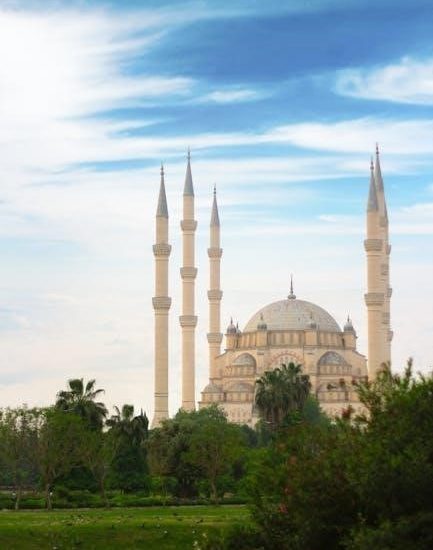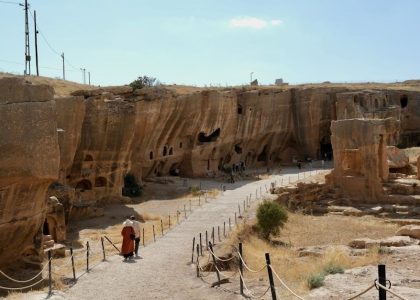Hajj, a divine command, is a sacred journey reflecting deep spiritual submission to Allah. It embodies unity among believers, fostering a transformative experience of faith and devotion.
The Significance of Hajj in Islam
Hajj is a cornerstone of Islam, fulfilling a divine command and reflecting submission to Allah’s will. It embodies unity, equality, and a profound spiritual journey. Pilgrims don simple attire, symbolizing humility and equality before Allah. The Quran emphasizes Hajj as a duty to Allah, linking it to accountability in the hereafter. Prophet Muhammad (peace be upon him) highlighted its transformative power, guiding believers to reflect divine guidance. Hajj cleanses the soul, fostering a deeper connection with Allah and strengthening faith. It is a universal act of worship, transcending cultures and backgrounds, uniting Muslims in a shared spiritual experience. Through Hajj, pilgrims seek Allah’s mercy, embodying the essence of surrender and devotion. This pilgrimage is a once-in-a-lifetime obligation, deeply impacting a Muslim’s life and spiritual growth.
The Fifth Pillar of Islam and Its Importance
Hajj, the fifth pillar of Islam, is a once-in-a-lifetime obligation for every able Muslim, embodying spiritual devotion and submission to Allah. It represents equality and unity, as pilgrims from all walks of life don the same simple attire, symbolizing their shared humanity. Hajj fosters a deep connection with Allah, offering a unique opportunity for seeking His mercy and forgiveness. It cleanses the soul, strengthens faith, and brings believers closer to divine guidance. This pilgrimage is not just a physical journey but a spiritual one, reflecting the essence of surrender and devotion. By fulfilling this duty, Muslims demonstrate their commitment to Allah’s commands, reinforcing their faith and integrating it into their daily lives. Hajj’s importance lies in its ability to transform and elevate a Muslim’s spiritual state.
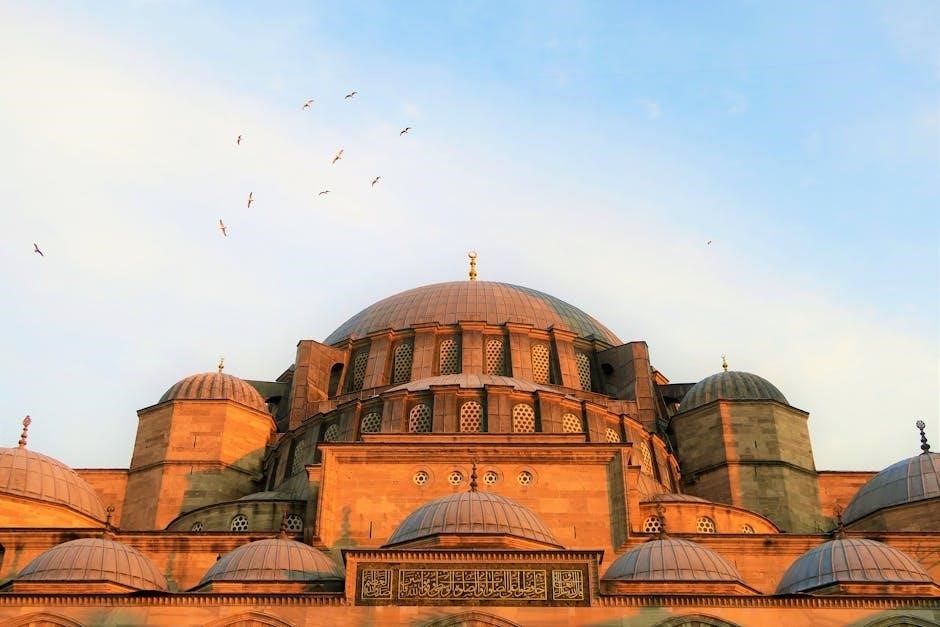
Spiritual Preparation for the Pilgrimage
Seeking Allah’s guidance, cleansing the heart, and strengthening faith are essential for pilgrims. This preparation involves reflection, repentance, and devotion to divine will. It ensures a pure intention and mindset for the sacred journey.
The Role of Intention (Niyyah) in Hajj
Niyyah, or intention, is the cornerstone of Hajj, ensuring actions are solely for Allah’s pleasure. It reflects sincerity and purity of purpose, aligning with the Quranic command to perform Hajj for His sake (2:196). A genuine intention transforms rituals into acts of worship, making them spiritually rewarding. Pilgrims must renew their Niyyah throughout the journey, fostering a deep connection with Allah. This mental preparation guides their actions, ensuring humility and devotion. Without a pure intention, the Hajj may lack its spiritual essence, emphasizing the importance of mindfulness and heartfelt dedication. Thus, Niyyah is not just a preliminary step but a continuous practice that enriches the pilgrimage experience.
Prayers and Supplications Before Embarking on Hajj
Prayers and supplications are vital as pilgrims prepare for Hajj, seeking Allah’s guidance and blessings. Many engage in additional acts of worship, such as reciting the Quran and performing voluntary prayers, to spiritually purify themselves. Specific supplications, like the Dua for traveling, are recited to seek safety and success. Pilgrims often ask Allah for forgiveness, protection, and the ability to fulfill the rituals with sincerity. These prayers reflect a deep reliance on Allah’s mercy and provision. By turning to Him before the journey, pilgrims cultivate humility and gratitude, ensuring their heart is prepared for the sacred journey ahead. These supplications also strengthen their resolve to fulfill Hajj with the right intentions and devotion.

Seeking Knowledge About Hajj Rituals and Etiquette
Seeking knowledge about Hajj rituals and etiquette is a fundamental step for every pilgrim. Understanding the sacred practices, such as Ihram, Tawaf, and Sa’i, ensures that the pilgrimage is performed correctly. The Quran and Hadith emphasize the importance of following the Sunnah of Prophet Muhammad (peace be upon him) during Hajj. Pilgrims are encouraged to learn about the rules and manners of each rite, including the proper times and places for specific rituals. This knowledge not only helps avoid mistakes but also deepens the pilgrim’s connection to the divine purpose of Hajj. By studying the teachings of Islamic scholars and authentic sources, pilgrims can fulfill their duties with sincerity and devotion, reflecting the true spirit of submission to Allah’s will.
The Rites of Hajj and Umrah
The rites of Hajj and Umrah are sacred rituals reflecting a pilgrim’s spiritual journey. They include Ihram, Tawaf, and Sa’i, symbolizing devotion, unity, and Allah’s divine guidance.
The Process of Ihram and Its Significance
Ihram, the sacred state of purity, marks the beginning of Hajj and Umrah. Pilgrims don simple, unseamed garments, symbolizing equality and detachment from worldly desires. The ritual includes specific prayers and intentions, reflecting a deep commitment to Allah. Ihram serves as a spiritual cleansing, preparing the heart for the holy journey ahead. It signifies a pilgrim’s readiness to surrender to Allah’s will, embodying humility and devotion. This sacred state reminds believers of their ultimate purpose: to seek closeness to the Divine. Through Ihram, pilgrims embark on a journey of self-reflection and spiritual renewal, guided by faith and the teachings of Islam.
Tawaf (Circumambulation Around the Kaaba)
Tawaf, the act of circumambulating the Kaaba seven times, is a central ritual in Hajj and Umrah. Pilgrims gather at the Holy Mosque in Makkah, facing the Kaaba, and begin their Tawaf. Starting at the Black Stone, they move counterclockwise, reciting prayers and supplications. Each circuit holds profound spiritual significance, symbolizing unity with all believers and devotion to Allah. Tawaf embodies the idea of orbiting around the divine, reflecting the harmony and order of the universe. Pilgrims, regardless of background, stand equal before Allah, their hearts focused on worship. This sacred act strengthens faith, fosters humility, and connects pilgrims to the Prophet Ibrahim’s legacy, reinforcing the eternal bond between the believer and the Almighty.
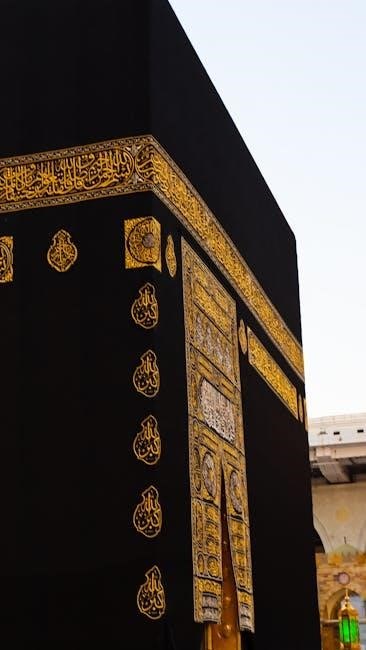
Sa’i (Running Between Safa and Marwa)
Sa’i, the act of running between the hills of Safa and Marwa, is a pivotal ritual in Hajj and Umrah. Rooted in the story of Hagar’s search for water for her son Ismail, this act symbolizes trust in Allah’s providence. Pilgrims begin at Safa, reciting specific prayers, then run to Marwa, repeating this seven times. Each lap mirrors Hagar’s journey, reflecting devotion and resilience. The ritual embodies spiritual renewal, as pilgrims seek Allah’s mercy and reflect on life’s challenges. Sa’i is both a physical endurance test and a profound spiritual exercise, fostering humility and connection to divine guidance.
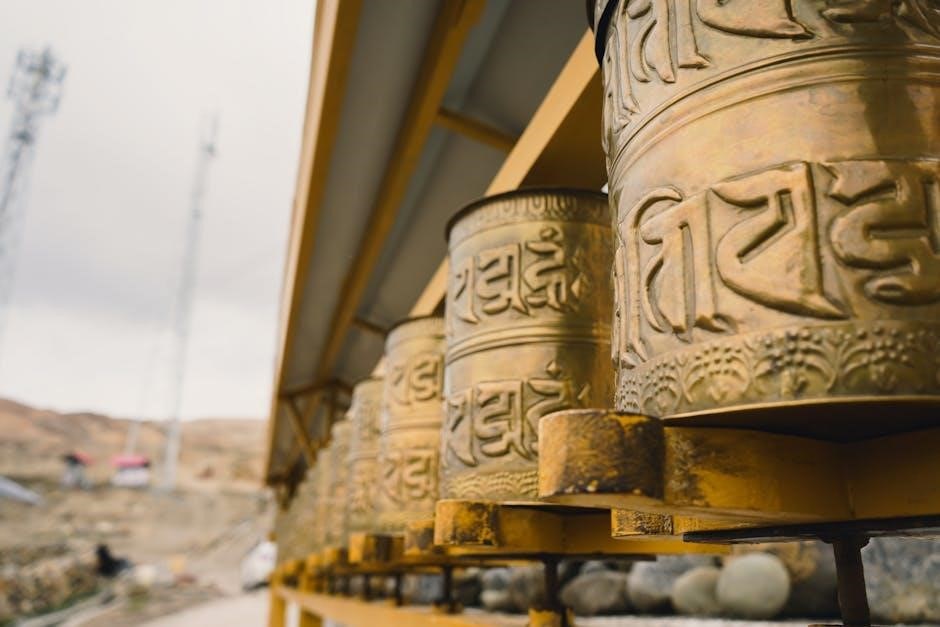
Historical and Religious Significance
The sacred sites in Makkah, including the Kaaba, hold profound historical and religious significance as symbols of Allah’s guidance and the unity of the Muslim community.
The Story of Prophet Ibrahim and the Kaaba
The Kaaba, Islam’s holiest site, was built by Prophet Ibrahim (Abraham) and his son Ismail under Allah’s divine guidance. This act of obedience symbolizes the cornerstone of Islamic worship and submission to Allah’s will. Ibrahim’s unwavering faith and dedication to constructing the Kaaba as a place of pure monotheistic worship laid the foundation for Hajj. The Black Stone, believed to have been given to Ibrahim by angels, is a revered symbol of this sacred structure. The story of Ibrahim and Ismail embodies the essence of surrender and devotion, reflecting the spiritual core of Hajj. Their legacy continues to inspire Muslims, reminding them of the timeless connection between faith, obedience, and divine purpose.
The Holy Sites in Makkah and Their Importance
Makkah, the spiritual heart of Islam, is home to sacred sites central to the Hajj pilgrimage. The Kaaba, built by Prophet Ibrahim and Ismail, stands as the most revered site, symbolizing the oneness of Allah. The Black Stone, believed to have been given to Ibrahim, is a cornerstone of the Kaaba, embodying divine blessings. Masjid al-Haram, the Grand Mosque, encompasses the Kaaba and serves as a focal point for worship. Mount Arafat, or the Mount of Mercy, is where Prophet Muhammad delivered his final sermon, emphasizing equality and compassion. Muzdalifah and Jamarat are key stops during Hajj, representing spiritual purification and the rejection of evil. These sites collectively embody the essence of submission, unity, and divine guidance, making Makkah a timeless beacon of faith for Muslims worldwide.
Lessons and Reflections from Hajj
Hajj teaches humility, unity, and submission to Allah’s will. Pilgrims reflect on life’s purpose, fostering spiritual growth and a deeper connection to their faith and community.
Spiritual Growth and Self-Reflection During Hajj
Hajj is a profound journey of spiritual growth and self-reflection, where pilgrims connect deeply with Allah. The rites of Hajj, such as Tawaf and Sa’i, symbolize a return to a pure, divine state. Through these acts, believers reflect on their life’s purpose and seek forgiveness; The unity of millions gathered in Makkah fosters a sense of brotherhood and humility. Pilgrims are reminded to let go of worldly attachments and focus on their spiritual essence. This sacred experience encourages introspection, helping individuals identify their shortcomings and strive for self-improvement. Hajj’s lessons in patience, gratitude, and surrender to Allah’s will guide pilgrims toward a renewed sense of purpose and a stronger faith.
Unity and Brotherhood Among Pilgrims
Hajj embodies the profound principle of unity and brotherhood, as millions of pilgrims from diverse backgrounds gather in Makkah. Clad in simple, identical attire, they stand as equals before Allah, transcending race, culture, and social status. This unity is a testament to the universal message of Islam, fostering mutual respect and compassion. The shared rituals, such as Tawaf and prayers, create a sense of togetherness, reminding pilgrims of their shared humanity and faith. The camaraderie among pilgrims strengthens bonds, reflecting the Islamic ideal of a global community united in worship and purpose. This collective experience leaves a lasting impression, inspiring pilgrims to uphold these values in their daily lives.
Hajj, a journey guided by Allah, transforms lives through profound spiritual renewal. Pilgrims return home with a deeper connection to their faith, forever changed by the experience.
The Impact of Hajj on a Muslim’s Life
Hajj profoundly transforms a Muslim’s life, fostering spiritual growth and deepening faith. Pilgrims return with renewed devotion, a stronger sense of purpose, and heightened moral awareness. The experience strengthens their connection to Allah, guiding them toward righteousness and humility. Hajj also cultivates empathy and unity, as Muslims from diverse backgrounds share a common spiritual journey. This pilgrimage instills a lifelong commitment toworship, charity, and self-refinement, reflecting Allah’s divine guidance in their lives. The lessons learned during Hajj empower Muslims to face life’s challenges with resilience and faith, embodying the teachings of Islam in their daily lives.
Returning Home with a Renewed Sense of Purpose
Upon completing Hajj, pilgrims return home with a rejuvenated spirit, ready to embody the teachings of Islam in their daily lives. The pilgrimage instills a profound sense of clarity and resolve, guiding individuals to prioritize their faith and values. Many find themselves more committed to worship, charity, and personal growth, reflecting Allah’s divine guidance. The experience fosters a stronger connection to the Muslim community, encouraging acts of kindness and compassion. Pilgrims often share their transformative journey, inspiring others to seek spiritual growth. This renewed sense of purpose enables them to navigate life’s challenges with faith and resilience, embodying the true essence of Hajj.

